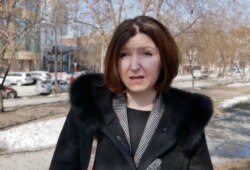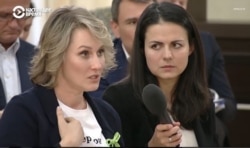These days, Yekaterina Teremshonok has plenty of time to stroll the streets of her native Novosibirsk, a Siberian city some 3,359 kilometers to the east of Moscow. Like millions of other Russians, Teremshonok, a former Moscow tour guide for foreigners, has been left to make ends meet as best she can since Russia closed its borders on March 30 and mandated a “non-working” period. And like others, she is finding that government support for those affected by the country’s coronavirus lockdown does not go far enough.
So far, the Kremlin has avoided the massive cash handouts to households that the United States, Japan, and other major economic powers have pledged as compensation for the loss of jobs and income from anti-coronavirus measures. Instead, it has granted a grace period for small and medium companies to pay taxes (other than Value Added Tax) and rent, placed a freeze on bankruptcies, and put together a business-loan program.
On April 16, Economic Development Minister Maksim Reshetnikov announced plans to extend grants to small and medium businesses that could be used as the businesses see fit, including for salaries. Retaining at least 90 percent of a company’s workforce would be a requirement for their receipt, Reshetnikov said. No figure was given for the size of the grants.
The minister told a cabinet session that more than 2 trillion rubles (nearly $27 billion) has already been spent on supporting the Russian economy amidst the COVID-19 pandemic. On April 15, the government announced plans to inject 28 billion rubles, or roughly $301.2 million, into one of the worst-hit economic sectors, the airline industry.
Nonetheless, prior to Reshetnikov’s announcement, some members of Russia’s business community did not believe the government had an effective economic stimulation package for the crisis.
“The measures undertaken by the government to support business are insufficient,” charged Yelena Dybova, vice-president of the Russian Federation Chamber of Commerce and Industry, on April 10. “Already in March, a lot of entrepreneurs didn’t have any money to pay salaries. There’s no money, none. And no place to get it and nowhere to earn it.”
Dybova’s non-profit organization has estimated that the coronavirus restrictions could force around 3 million entrepreneurs to close their businesses; events that could lead to “massive” unemployment.
Some projections predict an eventual national unemployment rate of up to 15 percent; a more than threefold increase from the 4.6 percent rate recorded in February.
In Moscow alone, a city of some 12 million, unemployment could amount to more than 10 percent of the working-age population, according to Delovaya Rossiya, a group which promotes the interests of private, non-energy-sector companies.
The Moscow city government has begun monthly unemployment payments of 19,500 rubles ($260.50) to help such workers, but restrictions exist. Laid-off tour guide Teremshonok, for instance, cannot qualify for the payments since she still works remotely one day a week for a tourism company.
Her income now amounts to just 9,000 rubles ($121.49) per month; roughly 6 percent of her former monthly salary of 160,000 rubles ($2,126).
“I totally wasn’t prepared for such a turn of events,” Teremshonok said. “I’ve got both a mortgage and a loan, and now I don’t have any work left at all.”
In the Russian capital, many in Teremshonok’s situation are looking for work at delivery services, online stores, or grocery stores; some of the only businesses still operating. Since late March, vacancies for couriers or drivers have doubled – a never-before-seen phenomenon, commented Maria Ignatova, research director for the job-search site HeadHunter.
But the Russian Federation Chamber of Commerce and Industry is looking for larger-scale solutions.
Along with three other business organizations, it sent the government a request on April 7 that it subsidize all shut-down companies until the end of the pandemic. The group proposed that recipients could use the subsidy to pay their rents and two-thirds of each employee’s monthly salary. As of April 10, the organizations had not received a response.
Anastasia Tatulova, owner of the Moscow-based Anderson cafe chain, however, got the chance to lay out her own business problems directly to President Vladimir Putin himself. In a videotaped meeting between the president and representatives of small and medium-sized businesses in late March, Tatulova urged the Russian leader to get tougher with his officials and take steps for more direct support.
Tatulova told Current Time that she has not been contacted for further discussion, as the president indicated. She has, however, apparently been kicked off a government-run business development commission.
“In general, nothing has changed,” she said on April 13. “During these three weeks, as before, I, and others like me, have not received any assistance. We constantly read about some measures, but, unfortunately, not a single one of these measures has anything to do with me and my business.”
All of the nine Anderson cafes in Moscow and the suburb of Zelenograd are closed. Tatulova’s business earns a bit of money for salaries from online delivery orders, she said The bulk of its income comes from a factory that prepares food for retail, catering, and for the VkusVill supermarket chain.
The Moscow city government, which has halted business rents until July, has worked out a subsidy plan that will allow her business to receive compensation for lost royalties from its franchised cafes, Tatulova said.
But a six-month loan program to help businesses pay salaries comes with so many restrictions “that no one goes for this loan, and even those who do are refused,” she claimed.
Tatulova doubts that Russian businesses will start to recover from the COVID-19 shutdown before mid-July.
Without changes in the central government’s approach, she cautioned, businesses’ chances for survival are doomed. “It’s just simpler now to liquidate [your business] and go bankrupt.”
Economist Oleg Buklemishev, director of Moscow State University’s Economic Policy Research Center, took a more optimistic view, however. If the question of fixed payments – taxes and rents as well as loans – is immediately resolved, “then I’m confident that it’ll be significantly simpler for small, medium, and, yes, large businesses to get back up on their feet again,” he commented on April 7.
But economist Vladislav Inozemtsev, director of Moscow’s Center for Post-Industrial Studies, argues that paying booster cash to retirees, the underprivileged, and small businesses, rather than to the Kremlin’s favored big businesses, “is the only sure method” for counteracting the economic crisis.
At 12 percent of Gross Domestic Product, a higher rate than in the U.S., United Kingdom, or Germany, the cash reserves the Russian government has built up in recent years “for a rainy day” could be used for these payouts to stimulate market demand, Inozemtsev advised.
Citing the government’s March 28 purchase of mega-oil-producer Rosneft’s loss-making Venezuela business, Inozemtsev, however, is not confident that officials will shift their thinking about how best to use Russia’s financial resources.
“I think that their actions will be in this same framework: They’ll support their friends’ big businesses and won’t go [to cover] the population’s losses.”
So far, though, a currency crash such as in 2014-2015, when the ruble lost over half of its value, has been avoided.
Investment banker Kirill Tremasov believes the Central Bank’s March decision to sell foreign currency for the ruble as oil prices began to slide was a “timely” move that introduced “an important element of stabilization into the currency market.” The April 12 deal with Saudi Arabia and the U.S. to reduce oil production to boost prices could strengthen the currency further.
Though the ruble has lost about 18 percent of its value since late 2019, it has held relatively steady in the past week, closing at 74.8 to the dollar on April 16.
Russia’s investment community now is watching to see if the Central Bank, as suggested by Chairwoman Elvira Nabiullina earlier this month, will lower interest rates from 6 percent in a bid to facilitate business financing, Tremasov said.
He characterized as “conservative” Nabiullina’s prediction that Russia’s economy will contract by just 1.5 – 2 percent as a result of the pandemic. He himself placed the potential slump at between 3 to 5 percent of GDP.
Economist Inozemtsev, however, predicts a worse scenario: Russia’s economy could shrink at an amount somewhere between the 5.5 percent predicted by the International Monetary Fund and roughly 10 percent, he said.
Though, with a constitutional referendum in the offing, such a crunch could put the government on tenterhooks, Inozemtsev underlined that no public unrest will occur from this slowdown.
“Starting in the 90s, the population – in Russia, Ukraine, Belarus – has gotten used to surviving purely economic difficulties,” he observed. “Therefore, I think that the economic decline will be taken, in general, like the objective reality. It won’t lead to any political upheavals.”
Despite her disappointment with the government’s support for smaller businesses, Tatulova also emphasized the need to avoid conflict between the authorities and businesspeople.
“We all need to agree and try to pull through somehow,” she said. “Because it’s all linked, and if the chain breaks, everything, one [business] after another, will collapse.”







